- Clone
- GL-1 (See other available formats)
- Regulatory Status
- RUO
- Other Names
- B7-2, B70, Ly-58
- Isotype
- Rat IgG2a, κ
- Ave. Rating
- Submit a Review
- Product Citations
- publications
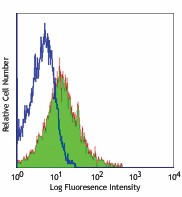
-

C57BL/6 mouse splenocytes stained with Ultra-LEAF™ purified GL-1,followed by anti-rat IgG FITC
Select size of product is eligible for a 40% discount! Promotion valid until December 31, 2024. Exclusions apply. To view full promotion terms and conditions or to contact your local BioLegend representative to receive a quote, visit our webpage.
CD86 is an 80 kD immunoglobulin superfamily member also known as B7-2, B70, and Ly-58. CD86 is expressed on activated B and T cells, macrophages, dendritic cells, and astrocytes. CD86, along with CD80, is a ligand of CD28 and CD152 (CTLA-4). CD86 is expressed earlier in the immune response than CD80. CD86 has also been shown to be involved in immunoglobulin class-switching and triggering of NK cell-mediated cytotoxicity. CD86 binds to CD28 to transduce co-stimulatory signals for T cell activation, proliferation, and cytokine production. CD86 can also bind to CD152, also known as CTLA-4, to deliver an inhibitory signal to T cells.
Product DetailsProduct Details
- Verified Reactivity
- Mouse
- Antibody Type
- Monoclonal
- Host Species
- Rat
- Immunogen
- LPS-activated CBA/Ca mouse splenic B cells
- Formulation
- 0.2 µm filtered in phosphate-buffered solution, pH 7.2, containing no preservative.
- Endotoxin Level
- Less than 0.01 EU/µg of the protein (< 0.001 ng/µg of the protein) as determined by the LAL test.
- Concentration
- The antibody is bottled at the concentration indicated on the vial, typically between 2 mg/mL and 3 mg/mL. Older lots may have also been bottled at 1 mg/mL. To obtain lot-specific concentration and expiration, please enter the lot number in our Certificate of Analysis online tool.
- Storage & Handling
- The antibody solution should be stored undiluted between 2°C and 8°C. This Ultra-LEAF™ solution contains no preservative; handle under aseptic conditions.
- Application
-
FC - Quality tested
- Recommended Usage
-
Each lot of this antibody is quality control tested by immunofluorescent staining with flow cytometric analysis. For flow cytometric staining, the suggested use of this reagent is ≤ 1.0 µg per million cells in 100 µL volume. It is recommended that the reagent be titrated for optimal performance for each application.
- Application Notes
-
The GL-1 antibody can block the mixed lymphocyte reaction in vitro and has been shown to inhibit the priming of cytotoxic T lymphocytes in vivo (along with antibodies against B7-1). Additional reported applications (for the relevant formats) include: immunoprecipitation1, immunohistochemical staining of acetone-fixed frozen sections2,6, immunofluorescence microscopy, and in vivo and in vitro blocking of T cell responses1-6. GL-1 is not suitable for immunohistochemical staining of formalin-fixed paraffin sections. The Ultra-LEAF™ purified antibody (Endotoxin < 0.01 EU/µg, Azide-Free, 0.2 µm filtered) is recommended for functional assays (Cat. No. 105051-105056).
-
Application References
(PubMed link indicates BioLegend citation) -
- Hathcock KS, et al. 1993. Science 262:905. (Block, IP)
- Inaba KM, et al. 1994. J. Exp. Med. 180:1849. (Block, IHC)
- Hathcock KS, et al. 1994. J. Exp. Med. 180:631. (Block)
- Krummel MF, et al. 1995. J. Exp. Med. 182:459. (Block)
- Liu Y, et al. 1997. J. Exp. Med. 185:251. (Block)
- Herold KC, et al. 1997. J. Immunol. 158:984. (Block, IHC)
- Shih FF, et al. 2006. J. Immunol. 176:3438. (FC)
- Lawson BR, et al. 2007. J. Immunol. 178:5366.
- Turnquist HR, et al. 2007. J. Immunol. 178:7018.
- Klinger MB, et al. 2007. Am. J. Physiol. Requl. Integr. Comp. Physiol. 293:R677. PubMed
- de Verteuil DA, et al. 2014. J Immunol. 193:1121. PubMed
- RRID
-
AB_2832340 (BioLegend Cat. No. 105055)
AB_2832340 (BioLegend Cat. No. 105056)
AB_2832340 (BioLegend Cat. No. 105054)
AB_2832340 (BioLegend Cat. No. 105051)
AB_2832340 (BioLegend Cat. No. 105052)
AB_2832340 (BioLegend Cat. No. 105053)
Antigen Details
- Structure
- Ig superfamily, 80 kD
- Distribution
-
B cells and T cells (upregulated upon activation), macrophages, dendritic cells, and astrocytes
- Function
- T cell costimulation, Ig class-switching, NK cell cytotoxicity
- Ligand/Receptor
- CD28, CD152 (CTLA-4)
- Cell Type
- Astrocytes, B cells, Dendritic cells, Macrophages, T cells, Tregs
- Biology Area
- Cell Biology, Costimulatory Molecules, Immunology, Neuroscience, Neuroscience Cell Markers
- Molecular Family
- CD Molecules, Immune Checkpoint Receptors
- Antigen References
-
1. Barclay A, et al. 1997. The Leukocyte Antigen FactsBook Academic Press.
2. Hathcock KS, et al. 1993. Science 262:905.
3. Freeman GJ, et al. 1993. Science 262:907.
4. Carreno BM, et al. 2002. Annu. Rev. Immunol. 20:29. - Gene ID
- 12524 View all products for this Gene ID
- Specificity (DOES NOT SHOW ON TDS):
- CD86
- Specificity Alt (DOES NOT SHOW ON TDS):
- CD86
- App Abbreviation (DOES NOT SHOW ON TDS):
- FC
- UniProt
- View information about CD86 on UniProt.org
Related FAQs
- Do you guarantee that your antibodies are totally pathogen free?
-
BioLegend does not test for pathogens in-house aside from the GoInVivo™ product line. However, upon request, this can be tested on a custom basis with an outside, independent laboratory.
- Does BioLegend test each Ultra-LEAF™ antibody by functional assay?
-
No, BioLegend does not test Ultra-LEAF™ antibodies by functional assays unless otherwise indicated. Due to the possible complexities and variations of uses of biofunctional antibodies in different assays and because of the large product portfolio, BioLegend does not currently perform functional assays as a routine QC for the antibodies. However, we do provide references in which the antibodies were used for functional assays and we do perform QC to verify the specificity and quality of the antibody based on our strict specification criteria.
- Does BioLegend test each Ultra-LEAF™ antibody for potential pathogens?
-
No, BioLegend does not test for pathogens in-house unless otherwise indicated. However, we can recommend an outside vendor to perform this testing as needed.
- Have you tested this Ultra-LEAF™ antibody for in vivo or in vitro applications?
-
We don't test our antibodies for in vivo or in vitro applications unless otherwise indicated. Depending on the product, the TDS may describe literature supporting usage of a particular product for bioassay. It may be best to further consult the literature to find clone specific information.
Other Formats
View All CD86 Reagents Request Custom ConjugationCustomers Also Purchased
Compare Data Across All Formats
This data display is provided for general comparisons between formats.
Your actual data may vary due to variations in samples, target cells, instruments and their settings, staining conditions, and other factors.
If you need assistance with selecting the best format contact our expert technical support team.
-
Brilliant Violet 650™ anti-mouse CD86
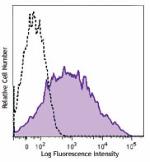
LPS-stimulated (3 days) C57BL/6 mouse splenocytes were stain... -
Biotin anti-mouse CD86
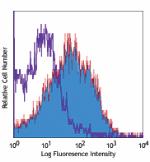
C57BL/6 mouse splenocytes stained with biotinylated GL-1,fol... -
FITC anti-mouse CD86
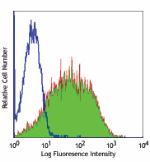
LPS-stimulated (3 days) C57BL/6 mouse splenocytes stained wi... -
PE anti-mouse CD86
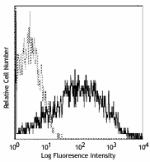
LPS (3-day) stimulated BALB/c mouse splenocytes stained with... -
Purified anti-mouse CD86
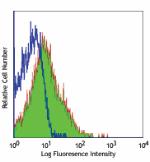
C57BL/6 mouse splenocytes stained with purified GL-1,followe... -
Brilliant Violet 605™ anti-mouse CD86
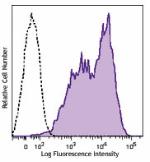
LPS-stimulated (3 days) C57BL/6 mouse splenocytes were stain... -
APC anti-mouse CD86
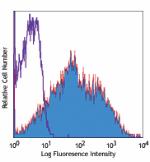
LPS-stimulated (3 days) C57BL/6 mouse splenocytes stained wi... -
PE/Cyanine7 anti-mouse CD86
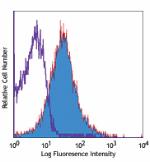
C57BL/6 mouse splenocytes stained with GL-1 PE/Cyanine7 -
Alexa Fluor® 488 anti-mouse CD86
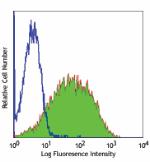
LPS-stimulated (3 days) C57BL/6 mouse splenocytes stained wi... -
Alexa Fluor® 647 anti-mouse CD86
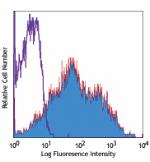
LPS-stimulated (3 days) C57BL/6 mouse splenocytes stained wi... -
Pacific Blue™ anti-mouse CD86
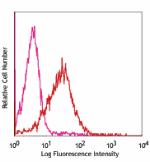
LPS (3-day) stimulated C57BL/6 mouse splenocytes stained wit... -
PE/Cyanine5 anti-mouse CD86
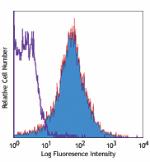
C57BL/6 mouse splenocytes stained with GL-1 PE/Cyanine5 -
Alexa Fluor® 700 anti-mouse CD86
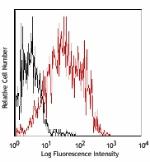
LPS-stimulated (3 days) C57BL/6 mouse splenocytes stained wi... -
PerCP/Cyanine5.5 anti-mouse CD86
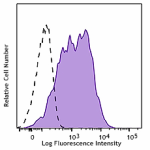
LPS-stimulated (3 days) C57BL/6 mouse splenocytes were stain... -
PerCP anti-mouse CD86
-
APC/Cyanine7 anti-mouse CD86
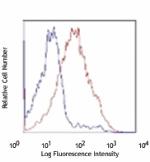
LPS-stimulated (3 days) C57BL/6 splenocytes stained with GL-... -
Brilliant Violet 421™ anti-mouse CD86
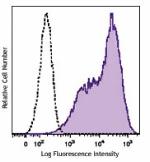
LPS-stimulated (3 days) C57BL/6 mouse splenocytes stained wi... -
Brilliant Violet 510™ anti-mouse CD86
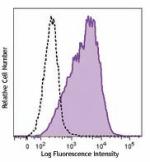
LPS stimulated C57BL/6 mouse splenocytes (3 days) were stain... -
PE/Dazzle™ 594 anti-mouse CD86
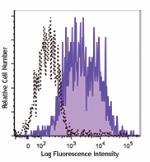
LPS-stimulated (three days) C57BL/6 mouse splenocytes were s... -
Brilliant Violet 785™ anti-mouse CD86
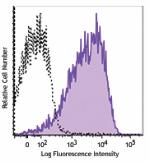
LPS stimulated C57BL/6 mouse splenocytes (3 days) were stain... -
APC/Fire™ 750 anti-mouse CD86
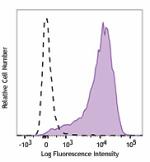
LPS-stimulated (3 days) C57BL/6 mouse splenocytes were stain... -
TotalSeq™-A0200 anti-mouse CD86
-
TotalSeq™-B0200 anti-mouse CD86
-
Ultra-LEAF™ Purified anti-mouse CD86
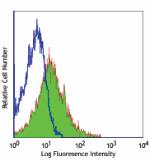
C57BL/6 mouse splenocytes stained with Ultra-LEAF™ purified ... -
TotalSeq™-C0200 anti-mouse CD86
-
Spark Blue™ 574 anti-mouse CD86 (Flexi-Fluor™)
-
Spark PLUS B550™ anti-mouse CD86

C57BL/6 mouse splenocytes were stained with anti-mouse CD3ε ... 
LPS-stimulated (3 days) C57BL/6 mouse splenocytes were stain...
 Login / Register
Login / Register 






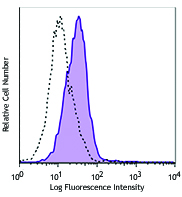
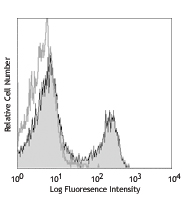
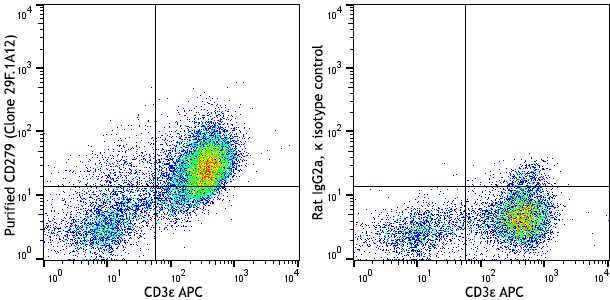
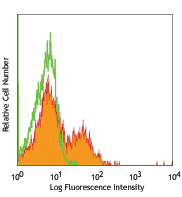



Follow Us